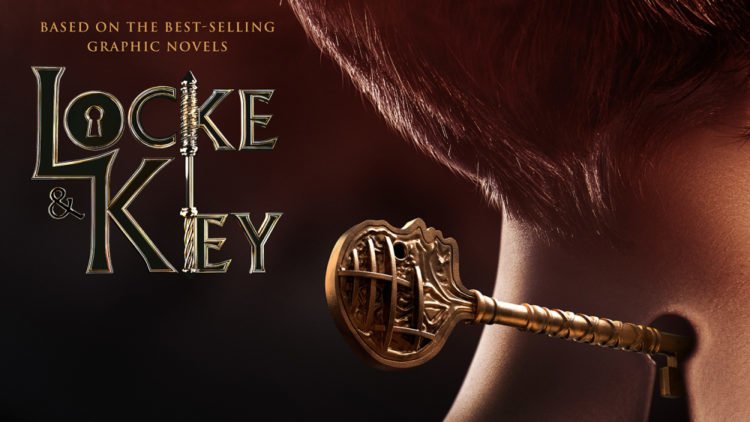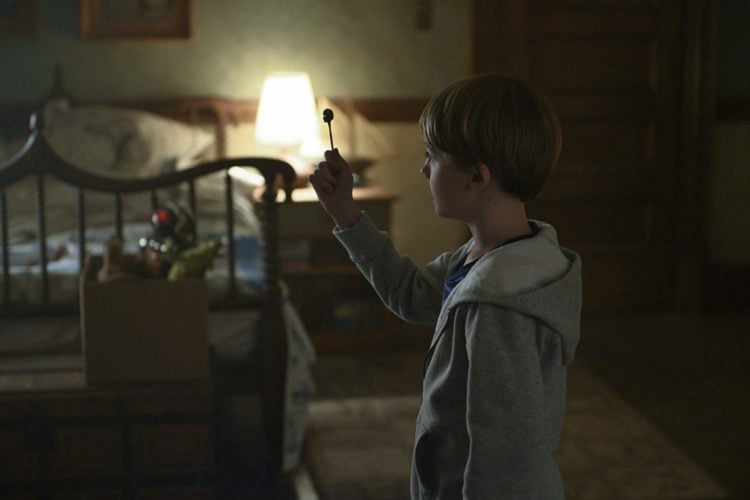
Netflix is back at it, bringing another well-known adaptation to the small screen with the just-released Locke & Key. Based on the IDW comic series created by Joe Hill and Gabriel Rodriguez, the story follows the Locke children—Tyler (Connor Jessup, Falling Skies, American Crime), Kinsey (Emilia Jones, High-Rise, Utopia), and Bode (Jackson Robert Scott, It, The Prodigy) — as they, along with their mother, Nina (Darby Stanchfield, Scandal, NCIS), move into the Locke family home after tragedy strikes. For fans of the original material, this version of Locke & Key takes quite a few liberties with the source material that may cause issues with the series’ direction. As someone who’s only sampled a small amount of the comic, I can say the first three episodes are a strong start to the series, giving viewers a firm grasp on the three protagonists while shrouding a vast majority of the narrative in mystery.
Like all good mysteries, it starts with a murder. In this case, it’s Rendell Locke (Bill Heck, The Alienist, The Leftovers). After hearing of his death, a man (who we later find out is Mark Cho) immolates himself using a key. Within 45 seconds, the premiere “Welcome to Matheson” establishes an air of intrigue before getting into the story proper. Finally arriving at the cross-country destination, the Locke clan pull into their new digs; the Locke family home. Shown around the mansion by their uncle Duncan (Aaron Ashmore, Killjoys, Veronica Mars) they don’t get much time to adjust before Kinsey and Tyler head off to school the next day. The high schoolers are instantly drawn into the usual high school teen angst while Bode makes a friend in the most unexpected of places — the wellhouse.
This echo, who we’ll call Dodge (Laysla De Oliveira, Code 8, The Gifted), gives Bode his purpose for the season, searching the estate grounds for keys that will whisper to him. Bode does just that and finds two such items — the Mirror Key and Anywhere Key — in quick succession. He loses the latter to Dodge when she deceives him into trading it for her help after his mom uses the Mirror Key only to get lost in what are the fragments of her own self. Curiouser still is after Tyler pulls his mother from the prison, Nina remembers none of it. This is the first real clue as to the bounds of magic at work.

“What’s the point of having magic keys if we can’t even use them?”
Whether it is his age, his earlier connection with Dodge, or some other unknown quality, Bode continues his Key-quest with great success. In “Trapper/Keeper”, he discovers the Mind Key which, as it sounds, allows the person (and those around them) to gain physical access to all the trappings of one’s mind. Aesthetically speaking, Bode’s inner workings look about as chaotic and playful as one would expect a child’s brain to be. It’s a far cry from Kinsey’s much more focused shopping mall brain her and Tyler explore later in the episode.
In “Head Games” he finds the Skull Key which allows him access to the astral plane. Jackson Robert Scott is a great choice for Bode, his boundless energy is the perfect foil to Kinsey’s standoffish uncertainty or Tyler’s bottled-up anger and regret. It’s likely this energy is what kept him attached to the project after the Hulu-backed pilot was cancelled and all roles (save his) were recast. As of the first few episodes, Bode’s role is clear but also lacks the depth of his siblings. As the only Locke not yet exhibiting the traumas of Rendell’s murder, Bode is that bright spot in a muddled portrait of gray and black. Though that is okay (and even necessary) early on, at some point Bode must also experience some sort of emotional shift for viewers to recognize his own struggles with Rendell’s death.

When comparing Kinsey and Tyler, it’s difficult to gauge which one is most miserable. Unlike Bode, who has yet to display traumatic flashbacks of Sam killing their father, both teenagers are haunted by those memories. This is displayed in their personal interactions with one another but also how they connect with their new peers.
Whereas flashbacks can often be a crutch weak writing often depends on, Locke & Key uses them in a way to further the story and add depth to the characters’ mental states. Aside from replaying their father’s death Kinsey and Tyler also relive the quieter and more special moments they shared with Rendell. As a teen, Kinsey still feels the trauma Rendell’s murder imprinted onto her psyche and she struggles to get past her feelings of cowardice; during the attack, she hid under the table with Bode and, when she and Tyler revisit the scene in her mind, she mentions the ‘what-ifs’. But despite her inaction (which probably saved her and Bode’s life), that albatross of guilt causes her to act in a way that, if possible, many would do. She returns to her own mind and kills the demonic representation of her fear. With fear no longer having a hold of her mind, I’ll be curious to see how the new (and improved?) Kinsey will behave. Yet, as germane to the plot as Kinsey displacing her fear is that Dodge watches it all take place. Knowing where Kinsey buried her fear will undoubtedly give Dodge an advantage when she eventually pits herself against the Locke children.
“The past is always with us, Tyler.”
And then we have Tyler. Though Kinsey’s personal shame is strong, her brother’s is even greater. It’s not just that he and Rendell had the typical father/son fights during that time in his life or that, in forgetting his key, Tyler wasn’t able to get into the house before Rendell was killed. It’s a moment he recalls in “Head Games”, where he makes an offhand comment about killing his father to Sam Lesser (Thomas Mitchell Barnet, Wayne, Run This Town), the boy who ends up killing Rendell during a confrontation about Locke house. Combining all those factors makes the guilt that Tyler feels unimaginable.
It’s only intensified by his choice to bottle those emotions inside him, never sharing that pain with his mother or Kinsey and that mounting anger, which has already spilled over when he gets in a fight after a hockey game (albeit coming to Kinsey’s rescue as a skeezy hockey player tries putting the moves on her). Connor Jessup exhibits that powder keg of emotions so well, never giving us a true handle on if he’ll burst into tears, spit out angry and hurtful words, or explode into violence. Perhaps the only positive thing he allows past his walls is Jackie (Genevieve Kang, Impulse, Crossword Mysteries). For Tyler, Jackie is more than just a good person, but she also is divorced from the traumatic experience, unlike his family. It doesn’t help his chances that he’s fallen into a less than pristine crowd in Javi (Kevin Alves, Shadowhunters, The Expanse) and Brinker (Kolton Stewart, The Expanse, Some Assembly Required), his hockey teammates. Tyler’s at a point where he could spiral into the doldrums of bad choices many teens do in times of crisis. Thus, it’s almost paradoxical that these keys, even in their danger, may be the saving grace to keep Tyler from freefalling into the abyss of his own pain.

One of the most positive aspects of Locke & Key thus far has been its focus on building up the Locke kids and their distinct personalities while only teasing the potential direction of the narrative. Kinsey and Tyler’s part of the story is especially refreshing, considering how their time at high school could have been one big bore-fest such as what was October Faction. Instead, their high school interactions are effectively used to complete their own personal struggles. Though Tyler is not hanging with the best of guys and he’s already stumbled with Jackie, Kinsey’s found an admirer in Scot (Petrice Jones, Step Up: High Water), and possibly her own clique in his Savini Squad (a group of misfits who sure do love their movies!). Even Nina has found kinship in Ellie (Sherri Saum, The Fosters), a former friend of Rendell and someone who may hold the key (figuratively and literally) to finding the truth about Dodge and what happened all those years ago with Rendell and his own squad of friends.
The narrative still has plenty of gaps to fill in but things are coming together for the series and now that we have a solid grip on the players, it’s time to take a deeper dive into the mythos behind the dreaded Locke house and its abominable (and divine) keys.
